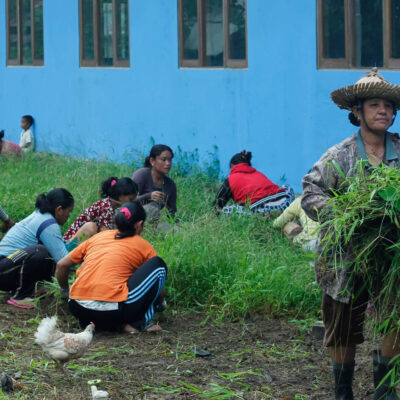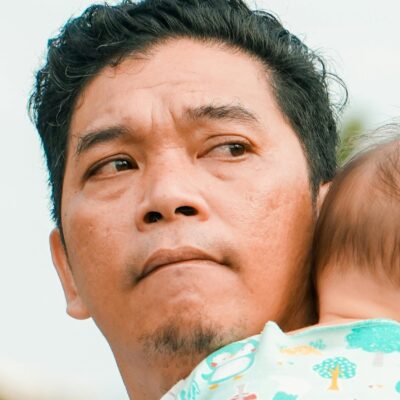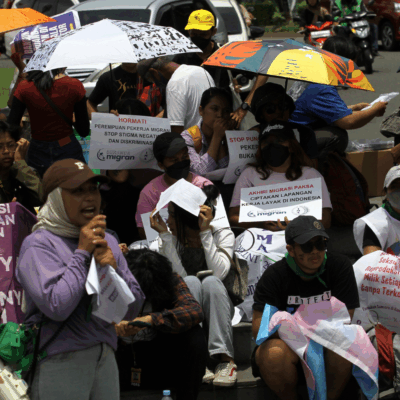Business investment in Indonesia has grown dramatically in recent years. According to the National Investment Coordination Agency (BKPM), realised foreign direct investment increased from Rp307 trillion in 2014 to Rp423 trillion in 2019 while domestic direct investment increased from Rp156 trillion to Rp386 trillion. This investment has gone into an array of industries including electricity, gas, water supply, transportation, warehouses, telecommunications, and mining. The economic challenges caused by COVID-19 may reverse this trend towards investment growth in the short-term but seems unlikely to do so in the long term.
At the same time, business-related human rights violations have continued unabated. Indonesia’s official national human rights body, the National Human Rights (Komnas HAM), has received thousands of complaints about corporate abuses of human rights in recent years, according to its annual reports. Most complaints have been made against private companies and some against state-owned enterprises. These abuses have related to a range of rights including to a clean environment, health, water, life, property, information, the rights of indigenous communities, and workers’ rights.
The number of complaints suggests that the Indonesian government’s existing policies have been ineffective in ensuring that businesses in Indonesia show adequate respect for human rights. They have accordingly highlighted the need for Indonesia to implement the United Nation’s Guiding Principles on Business and Human Rights (UNGPs). Endorsed by the UN’s Human Rights Council in 2011, the UNGPs require governments to protect human rights, businesses to respect human rights, and both to put in place systems to ensure that victims of rights abuses have access to remedies.
To translate this protect-respect-remedy framework into concrete change in practice, the country needs a national action plan for business and human rights. Such a plan will strengthen corporate responsibility for respecting human rights and, in turn, benefit companies in the long run.
Implementation of the UNGPs in Indonesia
Much has been done to implement the UNGPs in Indonesia including by government ministries and agencies, civil society organisations, and businesses. Since the UNGPs were endorsed by the UN’s Human Rights Council, these actors have been involved in a multitude of seminars, focus group discussions and activities relating to advocacy, education and other matters to promote the UNGPs within Indonesia. This has in turn led to a range of policy-related and other initiatives that have served to institutionalise the UNGPs in a variety of ways.
Policy-related initiatives
One important policy-related initiative has been Komnas HAM and ELSAM’s joint work to launch a national action plan on business and human rights. This initiative culminated in the publication of a draft national action plan on business and human rights in May 2017. This document had four main objectives:
- produce consensus among major stakeholders regarding the application of the UNGPs
- create a national standard and guidelines to guide corporate behaviour vis-à-vis human rights issues
- guide the government in developing relevant policies, and
- focus on prevention and remedy for human rights abuses committed by businesses.
This draft national action plan was given a legal foundation through Komnas HAM Regulation No 1/2017 on the Enactment of a National Action Plan on Business and Human Rights.
Another policy-related initiative is Minister of Maritime Affairs and Fisheries Regulation No 35/2015 on a Human Rights System and Certification for Fisheries Businesses. This regulation—which was adopted as a result of a partnership between the Ministry of Maritime Affairs and Fisheries (MMAF) and the Foundation for International Human Rights Reporting Standards (FIHRRST), a civil society organisation—was a response by government to a string of serious human rights abuses in the fisheries industry that included human trafficking, people smuggling, forced labour, child exploitation, torture, wage discrimination, failure to pay minimum wages, and unsafe and unhealthy work practices. The regulation sets out criteria for human rights compliance and requires fishing companies to conduct due diligence in the area of human rights. It was followed by Ministerial Regulation 42/2016 on work agreements for workers in the fishery sector, and Ministerial Regulation 2/2017 on the conditions and mechanisms for human rights certification in this sector. The latter makes it mandatory for businesses to submit a human rights audit in order to obtain a license to operate in Indonesia. In addition to these regulations, in 2018 MMAF established the Team for Human Rights in the Fisheries Industry by way of Ministerial Decree 84/2018. This Team is mandated with providing businesses with human rights accreditation.
A third and final policy-related initiative has been the integration (albeit so far in a limited way) of business and human rights into the country’s general national action plan on human rights, a plan which is overseen by the Ministry of Law and Human Rights. Presidential Regulation No.75/2015 on a National Action Plan for Human Rights 2015-2019 as amended by Presidential Regulation No.33/2018 includes business and human rights explicitly into the National Action Plan. Following the 2018 regulation, the Ministry of Law and Human Rights also referred to the recommendations issued by the UN Working Group on Business and Human Rights to follow a five-phase process in the development of a NAP on Business and Human Rights. However, this strategy was changed in order to enable the incorporation of the UNGPs in the general NAP on Human Rights, rather than a specialised instrument. The 2018 regulation introduces a requirement for the Ministry of Foreign Affairs to prepare National Guidelines on Business and Human Rights.
Other initiatives
Amidst these policy-related initiatives, the government has also appointed a focal point for business and rights within the Coordinating Ministry for the Economy to coordinate implementation of the UNGPs in Indonesia.
There has also been progress in implementing the UNGPs within the business community. As a manifestation of the corporate responsibility to respect human rights, businesses have to know about and be capable of demonstrating that they respect human rights. They can do this by:
- making a policy commitment that supports the responsibility to respect human rights;
- carrying out continuous human rights diligence to identify, prevent, mitigate and measure their human rights impact; and
- devising processes that make possible remediation for the human rights impact of their business activities.
Several businesses have made a policy commitment at the highest levels of the business. This includes SMART and Asia Pulp and Paper, both of which are trade names from the Sinar Mas group. In both cases, a policy commitment has translated into the company’s standard operating procedures (SOPs). There are also businesses that have made unwritten policy commitments. Examples include PT. Bumi Konawe Minerina and PT. Sulawesi Resources, both of which represent subsidiaries of the Solway Investment Group, a nickel mining company headquartered in Russia. Although the Solway Investment Group has expressed a commitment to human rights in its policies, this does not necessarily apply to its subsidiaries, including those in Indonesia.
Obstacles to implementing the UNGPs
According to Professor John Ruggie, the architect of the UNGPs, three governance systems have a bearing on business conduct in relation to human rights: ‘the system of public law and policy; a civil governance system involving external stakeholders that are affected by or otherwise have an interest in multinationals; and corporate governance, which internalises elements of the other two.’ Three elements operate within this polycentric governance arrangement: government, civil society, and business.
The various initiatives related to the implementation of the UNGPs in Indonesia cannot be separated from the different perceptions that each of these elements has towards the UNGPs. In particular, these initiatives cannot be separated from these elements’ different perceptions regarding their respective roles and contributions towards business and human rights, especially towards victims affected by business operations, services and products.
The fact these elements have different perceptions regarding the UNGPs is a critical point in the implementation of the UNGPs in Indonesia and represents the core challenge in progressing the UNGPs. This is because these different perceptions undermine the policy coherence required to determine policy design and implementation that will promote responsible business behaviour effectively. For instance, they have implications for the nature of the instruments used to promote business and human rights. At the moment, these instruments are based on the interests of specific ministries/state institutions with the result that there has not yet been established a coordinating mechanism between them.
Other critical points affecting the implementation of the UNGPs in Indonesia include:
- The government’s difficulty in translating the UNGPs into Indonesian. This impairs the government’s ability to align the UNGPs with the main duties and functions of government and contextualise them with the conditions and character of Indonesia.
- Businesses are still relatively uninvolved in efforts to promote business and human rights in Indonesia and the government is not yet considered to be serious in developing a policy framework for responding to issues of business and human rights. In addition, understanding among businesses about the UNGPs is underdeveloped.
- The advocacy strategies of civil society organisations are not yet coordinated and consolidated in a solid way especially with regards to the use of instruments that are voluntary and mandatory.
Taking the business and human rights agenda forward
Thus far, Indonesia has not yet developed a national policy on business and human on the basis of multi-stakeholder principles. This is because of the lack of involvement of business as an important actor regarding business and human rights. At the same time, as noted earlier, the lack of policy coherence indicates that there is no consensus on the UNGPs among the key elements.
Based on this reality, the President, as the highest office in government, needs to produce a legal framework through involvement of all parties. This should be in the form of integration of the UNGPs into the National Action Plan on Human Rights 2020-2024.
The move towards the inclusion of business and human rights into the NAP—rather than a specialised plan for human rights—followed a specific request from the President to do so. He is known to prefer this approach over the development of specialised NAPs. The President felt that a separate NAP on business and human rights would be considered a constraint to corporations and investment in Indonesia, which his administration seeks to promote. This concern was shared by other senior government officials, which further undermined the support for a specialised NAP on business and human rights.
To secure some recognition for the business and human rights agenda at a national policy level, those lobbying for a specialised National Action Plan on Business and Human Rights, including ELSAM, have instead decided to advocate for the incorporation of the business and human rights agenda into the National Action Plan on Human Rights. It is believed that this inclusion will have advantages in terms of coordination among government bodies. It should be especially useful for regional and local governments, which are increasingly becoming important actors for the implementation of human rights. However, at the time of writing the National Action Plan on Human Rights for the 2020-2024 period is yet to be enacted.
Authors: Adzkar Ahsinin, Andi Muttaqien, Muhammad Busyrol Fuad, and Ratu Durotun Nafisah. This article is a translation based on sections of their book: Perkembangan Bisnis dan HAM di Indonesia: Persepsi Negara, Masyarakat Sipil dan Korporasi, Jakarta: ELSAM, 2019. The authors wish to thank Andrew Rosser and Ken Setiawan for editing and translating these sections.
Image: Human Statues, Lapindo Mud Volcano. Credit: Adam Cohn/Flickr.




